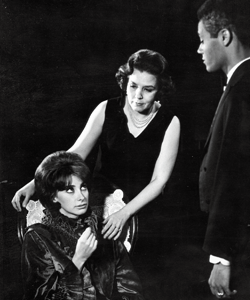The extraordinary lives of the Duke family have inspired many endeavors— often artistic, occasionally fictional. Some efforts, like the television dramas about Doris Duke’s life, take great liberties in their effort to dramatize personal lives and can be unflattering or simply untrue. In 1964, however, a play was written intending to honor the Dukes— specifically to honor James and Benjamin Duke’s partnership with president William Preston Few and the subsequent creation of The Duke Endowment and founding of Duke University.
Written by Charles “Buck” Roberts ’52, G ’53, The Dukes dramatizes James B. Duke and Few’s collaboration in envisioning a university. After graduating, Roberts worked for Duke Admissions, but his real passion was theater: He had been president of Hoof ‘n’ Horn and was involved in Duke Players. He participated in the Durham Theater Guild and opened a performance space for the Coffee House Players in September 1963 in an old restaurant on Broad Street (where the Joe Van Gogh coffee shop and Palace International restaurant exist today).
The Dukes was written to coincide with the fortieth anniversary of The Duke Endowment and Duke University in 1964. One copy of the script can be found in the University Archives’ Few Family Papers, part of a recent accession of materials belonging to Few’s widow, Mary Reamey Thomas Few, who advised Roberts as he developed and produced the play.
 The story opens at Four Acres, Benjamin Duke’s home in Durham, with Ben mourning the recent loss of his son Angier. His wife, Sarah, encourages him to try to climb out of his grief. First in this scene, and throughout the play’s three acts, Few, Ben Duke, and James “Buck” Duke discuss the potential of doing “something big,” and they debate what kind of legacy a person leaves behind. Few’s suggestion of “making a university out of our little Trinity College” inspires Buck Duke to establish The Duke Endowment in Charlotte—hence the transformation of the college into Duke University.
The story opens at Four Acres, Benjamin Duke’s home in Durham, with Ben mourning the recent loss of his son Angier. His wife, Sarah, encourages him to try to climb out of his grief. First in this scene, and throughout the play’s three acts, Few, Ben Duke, and James “Buck” Duke discuss the potential of doing “something big,” and they debate what kind of legacy a person leaves behind. Few’s suggestion of “making a university out of our little Trinity College” inspires Buck Duke to establish The Duke Endowment in Charlotte—hence the transformation of the college into Duke University.
A subplot of The Dukes is Mary Duke’s strained relationship with and subsequent divorce from her husband, Anthony Joseph Drexel Biddle. Roberts took liberty with timelines to compress Mary’s and Tony’s divorce (1931) with the founding of The Duke Endowment (1924) and the death of James B. Duke (1925). Most of the members of the Duke family are represented in the play, including Mary Duke Biddle Jr., Mary’s daughter, and Doris Duke, both of whom were children when the events of the play took place. All of the roles were played by mostly local actors, with the exception of Few, who was played by professional actor Richard Kinter.
Given that the play was written forty years after the events it dramatizes, there are some nods to the knowing audience. At one point, Sarah P. Duke, grandmother of Mary Duke Biddle Jr., comments about her granddaughter, “She is going to grow up to be a fine young lady and marry a fine young man someday. I’d like to think he’d be a doctor. That’s it—a doctor.” The audience, of course, knows that Mary Duke Biddle Trent Semans in fact married two doctors. Later in the play, Buck’s wife, Nanaline, suggests to her husband that he might create an estate in Asheville that could be a tourist attraction. Buck responds, “Tourist attractions are fleeting—I want to do more permanent good”—a subtle dig at the Vanderbilts.
The Dukes, which concludes with the finalization of the endowment and creation of the university, as well as a depiction of James B. Duke in decline, was reviewed in the December 11, 1964, issue of The Chronicle. The review, titled “The Dukes: Little Impact,” is lukewarm, but the anonymous reviewer “would certainly recommend ‘The Dukes’ for its historical value, its local color, and principally that the story has a great deal of charm.” Buck Roberts continued to write and produce plays, and he encouraged the growth of a local theater community in Durham. The Rubenstein Library holds a collection of his papers.
The Dukes was performed again during Durham’s celebration of the American bicentennial in 1976. As far as we know, however, the play has not been performed since. Perhaps a revival to coincide with the centennial in 2024 is in order?
Gillispie is the university archivist.

Share your comments
Have an account?
Sign in to commentNo Account?
Email the editor